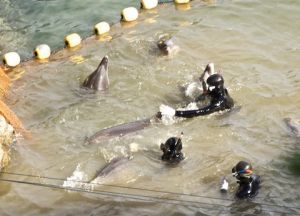Laura Bridgeman takes a look at the scientific evidence that may explain why dolphins have such a benevolent nature when it comes to interactions with humans……..
 Many people are now familiar with the scene that is playing out in the photo to the right. It was taken in Taiji, Japan, a place where hunting and killing dolphins is commonplace. However, this particular photo captures a moment in time that bears closer scrutiny. It presents us with compelling questions about dolphin emotional intelligence and their relationships with humans, and it challenges us to rethink the way we treat these beings of the sea.
Many people are now familiar with the scene that is playing out in the photo to the right. It was taken in Taiji, Japan, a place where hunting and killing dolphins is commonplace. However, this particular photo captures a moment in time that bears closer scrutiny. It presents us with compelling questions about dolphin emotional intelligence and their relationships with humans, and it challenges us to rethink the way we treat these beings of the sea.
Take a closer look at the photo. It captures the last few moments of these dolphin’s lives, as the divers you can see in the water guide them to their deaths. These dolphins are going – unwillingly, yet relatively peacefully – beneath a tarpaulin-covered area where they will be restrained by their tails beside one another.
A metal spike will then be driven slowly into their heads. To watch this process, see below (warning: graphic content is distressing). Their family and friends are thrashing about in the water all around them, utterly exhausted and likely terrified after the hours-long chase that brought them into the fishermen’s nets. If you look closely at the photo, you can see that some of the dolphins are already bleeding, the result of hurling themselves upon the rocks in an attempt to escape the fishermen and the horrors that are occurring beneath the tarpaulin.
The dolphins in this photo have been backed into a corner, with fishermen and certain death on one side, and the net separating them from freedom on the other. What species of wild animal do we know of – or even who among our own – would not lash out when backed into such a corner?
Yet, like the thousands of dolphins before them, these dolphins will not attack. And not for lack of ability – weighing in at around 800 pounds, armed with sharp teeth and powerful tails, these top predators could do some serious damage to those humans in the water. But they refrain, time and again. This undeserved benevolence towards humans is baffling, at best. However, scientific investigations of the dolphin brain appear to offer some insight to this complaisant behavior.
Our brains share many structural similarities with dolphins. For example, we both have a limbic system, which is responsible for handling emotional information. One difference between us, however, is that the dolphins’ limbic system is much larger than ours and, says scientist Denise Herzig, it “may be stretched out over more of the brain,” indicating that “the dolphin brain may have more of a ‘global connection’ to [emotional] information”. This could mean that dolphins are more emotional than humans, and that emotions could figure more prominently throughout their thought processes.
While it might be tempting to think that increased emotions would lead to greater aggression when being backed into a corner, another compelling feature of the dolphin brain appears to account for this notion. Sterling Bunnell, in The Evolution of Cetacean Intelligence points out that the cerebral cortex, responsible for logical thought and reasoning in both humans and dolphins alike, is controlled by the emotional activity of the limbic system. This process is facilitated by what are called ‘neocortical association neurons’.
Bunnell observed that, in human studies, the ratio of these neurons to limbic-system brain stem neurons “is necessary for such qualities as …emotional self-control” and that a decreased ratio is associated with “impulsiveness, emotional instability, irritability, loss of humor”. Bunnell points out that dolphins possess a higher neocortical-limbic ratio than the average human, suggesting that their control over their own emotions is greater than what we experience.
It could be that dolphins, while being more emotional, are more emotionally stable than we are, and are therefore able to better control themselves in stressful situations. This could explain their apparent control over the impulse to lash out at the humans who are so callously ending their lives.
Read full story: Ecologist
wie schrecklich..man kan es kaum in worte fassen..bin immer wieder fertig von soviel grausamkeit!